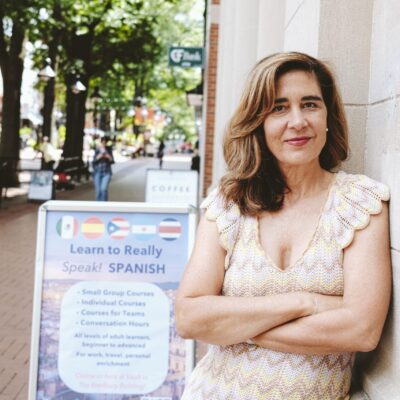The rotten awning on Ophelia Wells’ Fifeville home was patched last fall. In two months, repair crews organized and operated by AHIP—the Albemarle Housing Improvement Program—installed a new roof and siding. They also resolved plumbing and electrical problems and conducted a lead paint abatement program inside the house. The cost? Roughly $55,000—not an unusual cost for the job, but a price that may be increasingly difficult for AHIP to cover.
|
“People don’t pay attention to rehabilitation and repair as much,” says AHIP Executive Director Jennifer Jacobs. A home like Ophelia Wells’, in Fifeville, subtly proclaims its health—a $55,000 repair job. “They did a lovely job inside and out,” says Wells. |
Last month, City Council agreed to commit $1.4 million from the city’s general fund to the Charlottesville Housing Fund (CHF). Supplemented by two major federal grant programs, the $1.4 million annual commitment was designated to increase the number of affordable units in Charlottesville to 15 percent of the city’s total housing stock. The CHF money is split among organizations that cover every element of low-income housing in the city, from helping homeowners obtain reasonable financing to building new homes.
AHIP falls in the middle—an organization that coordinates emergency repair and rehabilitation work on city and county homes for residents that earn 80 percent of the area median income. Rather than use its money to demolish one home and construct another, AHIP preserves the scale and character of existing homes in neighborhoods like Fifeville, Orangedale, 10th and Page, and Ridge Street. While an organization like Habitat for Humanity raises new homes, AHIP maintains the old—an inevitable job, but one with increasingly tight constraints.
Funding to AHIP has steadily declined, from $279,000 in FY2007-2008 to $150,000 in FY2010-2011—a 46 percent decrease. The organization is also increasingly expected to make a greater number of small fixes rather than a few massive repairs. Prior to this year, the limit on AHIP’s rehabilitation costs per house was $50,000. This year, the cap was halved.
“The city wants us to keep rehab costs at $25,000 per household in order to stretch housing dollars and help more families,” says AHIP Executive Director Jennifer Jacobs. “But for many of these old houses, $25,000 amounts to a large emergency repair and doesn’t address major household systems that really need to be replaced.” At present, AHIP’s emergency repairs list includes 45 city homes, while its rehabilitation list numbers 175.
Additionally, Council agreed in December to make the Crossings at Fourth and Preston, a proposed single-room occupancy facility to be built on Preston Avenue and owned by Virginia Supportive Housing, the beneficiary of federal HOME Program funds. Along with Community Development Block Grants, HOME grants were previously used to boost programs financed by CHF. HOME funds, which total an estimated $130,000 annually, will be comitted to the Crossings for the next decade. For FY2011, AHIP received a combined $168,000 in CDBG and HOME grants, which funded repairs for five more family homes.
Jacobs says that AHIP is trying to up its private fundraising to stretch CHF money further. The organization is also exploring a working arrangement with Charlottesville’s Habitat for Humanity program, which received $400,000 from the CHF this fiscal year and breaks ground on its 60-home project in Sunrise Trailer park on Tuesday, March 15. Some old homes, coated with lead paint and without foundations, might not be salvageable, so a Habitat partnership might give AHIP a way to merge new homes with old neighborhoods. And, of course, new homes eventually need repairs, too.
/RI_-IMG_0154.jpg)





